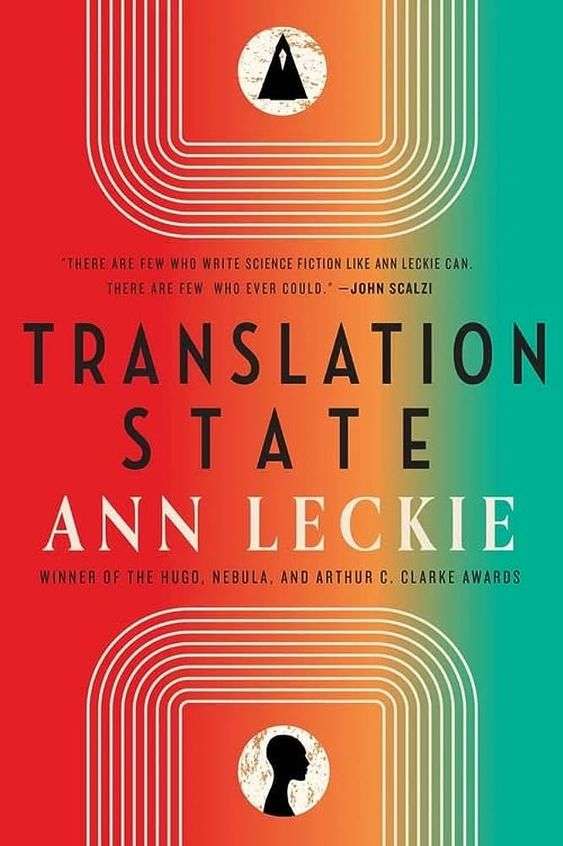Translation State by Ann Leckie from @OrbitBooks #BookReview #SciFi
Translation State by Ann Leckie
Orbit books, £20.00, hardback
Reviewed by Nadya Mercik

“The funny thing about having a name is that you begin to think of yourself as something that continues to exist, instead of just a stream of experiences.â€
As I write this, I am thinking that I need to translate my thoughts and emotions after reading Ann Leckie’s brilliant novel into a review. Translation is a very rich and intricate notion. It goes beyond traversing the languages into building and expressing your identity, for example, when you immigrate and start belonging to a new culture. Translation is about change and conversion, which in other words, is about looking for a reference point and navigating from one state to another. It is as much of a transformation as of establishing because you can’t translate something unless you establish it. In mechanics, translation designates such motion of the body when all its particles move along parallel paths with the same velocity. And, of course, in genetics, messenger RNA code translates into a sequence of amino acids to synthesise protein.
While reading Translation State by Ann Leckie, I caught echoes of all these aspects, which merged into a profound, philosophical yet full of adventures story. Translation State has elements of a coming-of-age novel since we see the protagonists, Qven, developing from an early age. However, this is necessary to give us a grounding in who Qven is. The main focus, of course, is on realising their true self and asserting it despite all social and historical norms. It is the story of translating themselves beyond their genes and affiliations demanded of them.
Qven isn’t human – Qven is a Presger Translator, a being that fulfils a liaison function between mysterious Presgers and humans. Just like any other Translator, they have a function and future assigned to them from the start under the condition Qven doesn’t fail. There is one particular ritual every Presger Translator has to go through – a matching with another person, but Qven is averse to it for a reason.
As Qven rebels against their destiny on the Presger Translators’ territory, in the wider world, two other people are brought together by circumstances. Enae Arthur spent decades of hir life taking care of the ill-tempered Grandmaman, but now the woman is dead, and Enae finds hirself on a diplomatic mission to find a fugitive who’d been missing for two hundred years. It wasn’t her choice, and after so many years of being under Grandmaman’s thumb, she doesn’t know much about the world or about hirself, hir own desires and aspirations. This is her chance to explore, and though reluctantly, at first she takes it.
Reet Hluid is a mechanic in the pipe ways on Rurusk station; he was adopted as a child and has never known his true family. He has always felt odd and out of place. Desperate to understand who he is and find where he belongs, Reet gets involved with a Hikipi faction, that helps him get a job with the Foreign Affairs. When Enae arrives at Rurusk Station with her search mission, Reet is assigned as her liaison. None of them suspects this meeting will be instrumental in finding answers to these and many more questions, or the scale the events will take as the conclave on the important Presger-human treaty is to assemble.
The story is told from three points of view – Enae’s, Reet’s and Qven’s. Before we meet Qven, whose story is given in the first person, we see the world through Enae’s and Reet’s eyes, which helps us to get some grounding before experiencing a rather unusual perspective of the Presger Translator. The novel has a rhythmic, harmonious structure to it – chapter after chapter, we go in a loop from Enae to Reet and then Qven, ascending the expanding spiral of the story.
Ann Leckie masterfully creates various species and their agendas, showing the brutal politics of the universe, which clash with individual lives threatening to destroy them. A Radchaai diplomat who pushes everyone to move in the same direction with the same dedication for the sake of the treaty and peace but who, in truth, seeks to preserve the might of her own nation. Translators’ rules are justified by their genetics and yet manipulated by inside politics. The seemingly unopposable powers that Qven, Reet and Enae stand against. Translation State draws parallels between the multifaceted universe and the multifaceted personas within one person, which at times need to be sorted through. For me, a vivid image of that was the mention of “the multibodied Radchaai rulerâ€, who “had split into factions of herself and begun a civil warâ€.
Translation is all about finding the right language – language to express yourself and others. Reet “learned easily, though Hikipi was a very different sort of language from the ones he’d grown up speaking. Its internal logic seemed to fall neatly into place in Reet’s mind, and the more he learnt the more he enjoyed it.†Ann Leckie goes into all the trouble to introduce and keep consistent various neo-pronouns, non-binary titles and gender-neutral family relation terms. It might look a bit overwhelming at the beginning, but it goes hand in hand with everything the book is about. Just like Reet finds the Hikipi language responding to his internal logic, how learning human language changes the reality perception for Qven, so immersing in gender-versatile language gives us more accurate translations of the personalities in the book.
All in all, Translation State is a canvas embroidered with so many threads that you can come back to it again. After all, translations aren’t set in stone – there are ways to express things differently, there are nuances in the language and identity to be caught – and state presupposes continuity.

